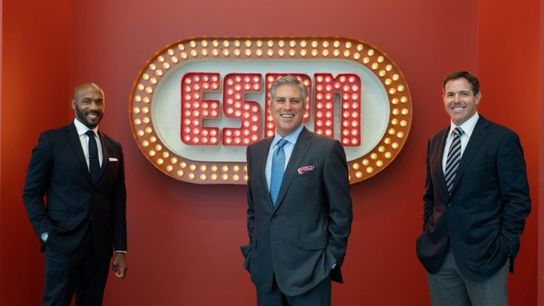When ESPN made the decision to move on from Joe Tessitore and Booger McFarland after just two seasons, the self-proclaimed Worldwide Leader in sports swung for the fences. Al Michaels, Peyton Manning, Tony Romo -- all were rumored targets, none took the job. It's a wonder ESPN didn't spend any of its billions trying to bring Hologram Howard Cosell into the booth.
In the end, ESPN promoted Steve Levy, Brian Griese and Louis Riddick to its top booth -- all pros, veterans of the network, and well-reviewed for the work on college football or NFL studio work, respectively -- though the fact that the team wasn't formally announced until Aug. 17 was curious. There were no preseason games available to call, but an entire summer of getting Levy, Griese and Riddick in front of as many cameras as possible fell by the wayside.
When the season started, though, ESPN's curious strategy for promoting its new MNF team became outright strange, when Bristol called up Chris Fowler and Kirk Herbstreit to call a MNF game. That itself wasn't unusual; ESPN's college slate is light for the time being, and the network always closes down the NFL's Week 1 with a Monday night doubleheader.
But ESPN gave Fowler and Herbie the premier game -- Steelers at Giants; played in primetime on the East Coast, between two of the league's biggest brands -- while sticking its new "A" team on Titans at Broncos, a game that didn't even begin until 10:15 p.m. ET.
And now that continues to Week 2, as the New York Post's Andrew Marchand reports Herbstreit and Rece Davis will work a simulcast of Saints at Raiders at the same time Levy, Griese and Riddick call the exact same game.
It isn't a question of viewership -- most viewers will likely park the clicker on ESPN or ABC and leave it at that -- but the message behind it. Why make your new team compete with someone on your own network? Why is ESPN even bothering to air an alternate feed to begin with? Wouldn't you want the strongest possible viewership number on ESPN? What's in this for Davis and Herbstreit?
Presumably, the Monday night job would have been Herbstreit's if he wanted it, so why is ESPN giving its backup team reps before its brand new starting team can even introduce themselves to the audience?
What's the old saying? If you have two No. 1 broadcast crews, you don't have one.
It's no secret that ESPN wants its Monday night broadcasts to stand up with the best CBS, Fox and NBC have to offer. There's nothing inherently wrong with that. MNF is ESPN's most valuable property, so of course they're going to put their best foot forward on a night where they more or less have the entire sporting world's attention to themselves. It's just that they're trying to love this rabbit so hard they're petting the poor thing to death.
MNF's biggest problem isn't the broadcasters, not necessarily. It's a crippling case of Corporate Overthink, a disease that has manifested in a revolving door inside the broadcast booth.
The first symptom appeared when Dennis Miller was hired in 2000, but the disease has been especially pronounced since Mike Tirico left for NBC in 2016. ESPN has employed three different play-by-play voices in five years, and four separate color analysts in the past three seasons. They've even changed rules analysts twice since 2017.
Fowler and Herbstreit drew rave reviews for their work Monday night, because of course they did. They're two of the best in the business, and they have a working chemistry built on spending every fall Saturday together going back 25 years.
In trying to duplicate that, ESPN faces three choices: 1) promote Fowler and Herbstreit outright, a move that either the talent or executives didn't want to do; 2) spend what it takes to buy A-list talent from another network (Romo) or out of retirement (Manning); or 3) pick a team and give them a chance to grow into the role. There's no fourth option.
And here's the crazy part: people don't watch NFL games for the announcers. They'll tune out if the talent is unbearable, sure, but no one watches a game specifically because of who's calling it. The networks know this. CBS gave Romo $180 million, and even they know it! That move was more a show of fealty to the NFL than anything; CBS knows it will never recoup that money with increased, Romo-specific ratings.
People watch sports, and specifically football, because they want to see the game. That's it. Every Monday night from September through December, ESPN has the only sporting event that matters in this country on its airwaves. That alone should be enough. Put out a good product and let the game do the rest.
But it's never going to be enough for them because Monday Night Football can't just be an NFL game, it has to be an event. It's fitting that this news breaks today of all days, the 50th anniversary of the first MNF broadcast. ESPN has devoted untold resources in dollars and manpower into a problem it can't possibly solve. No announcing team can make it 1970 again.
The novelty of football on a weeknight wore off two generations past, and the NFL itself admitted as much when it began flexing important late-season games to NBC's Sunday night game as opposed to MNF a decade and a half ago.
If ESPN was so determined to fight against that reality that it wanted Kirk Herbstreit or Tony Romo or Peyton Manning to work its games, it should have paid up and hired them. It didn't. And so ESPN should give Levy, Griese and Riddick a chance to actually break a sweat in their new QB1 role before warming up the backup quarterback.
